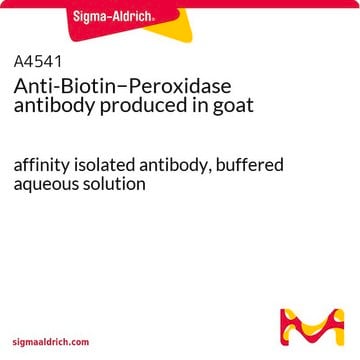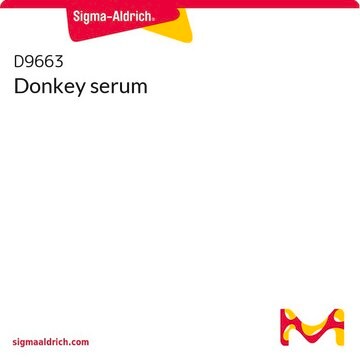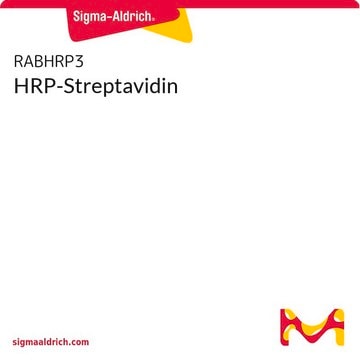A0185
Monoclonal Anti-Biotin−Peroxidase antibody produced in mouse
clone BN-34, purified immunoglobulin
Synonym(s):
Monoclonal Anti-Biotin
About This Item
Recommended Products
biological source
mouse
Quality Level
conjugate
peroxidase conjugate
antibody form
purified immunoglobulin
antibody product type
primary antibodies
clone
BN-34, monoclonal
packaging
vial of 0.5 mL
technique(s)
dot blot: suitable
flow cytometry: suitable
immunohistochemistry (formalin-fixed, paraffin-embedded sections): 1:300
indirect ELISA: 1:30,000
western blot (chemiluminescent): 1:80,000
isotype
IgG1
storage temp.
2-8°C
target post-translational modification
unmodified
Looking for similar products? Visit Product Comparison Guide
General description
Immunogen
Application
- in immunohistochemistry
- in western blot
- as secondary antibody to detect the presence of aptamer on the membrane
In some applications, localization of biotinylated probes with avidin produces high background levels. Anti-biotin reagents may be substituted for avidin to decrease non-specific binding.
Biochem/physiol Actions
Monoclonal Anti-Biotin-Peroxidase antibody specific for biotin conjugated to various proteins. The antibody recognizes free biotin and biocytin using competitive ELISA. Using indirect ELISA or immunohistochemical staining, the antibody also recognizes biotin conjugated to various immunoglobulins. The product specificity has been evaluated using biotinylated goat antibodies to human and rabbit antigens coated on multiwell plates.
Physical form
Disclaimer
Not finding the right product?
Try our Product Selector Tool.
Signal Word
Warning
Hazard Statements
Precautionary Statements
Hazard Classifications
Skin Sens. 1
Storage Class Code
12 - Non Combustible Liquids
WGK
WGK 2
Flash Point(F)
Not applicable
Flash Point(C)
Not applicable
Certificates of Analysis (COA)
Search for Certificates of Analysis (COA) by entering the products Lot/Batch Number. Lot and Batch Numbers can be found on a product’s label following the words ‘Lot’ or ‘Batch’.
Already Own This Product?
Find documentation for the products that you have recently purchased in the Document Library.
Customers Also Viewed
Our team of scientists has experience in all areas of research including Life Science, Material Science, Chemical Synthesis, Chromatography, Analytical and many others.
Contact Technical Service











